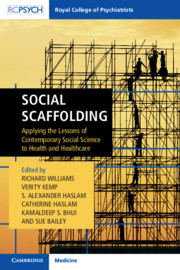Book contents
- Social Scaffolding
- Social Scaffolding
- Copyright page
- Contents
- Contributors
- Foreword
- Note
- Section 1 Schooling
- Chapter 1 Health and Society: Contributions to Improving Healthcare from the Social Sciences
- Chapter 2 Six Features of the Human Condition: The Social Causation and Social Construction of Mental Health
- Chapter 3 Social Sciences and Health: A Framework for Building and Strengthening Social Connectedness
- Chapter 4 The Social Identity Approach to Health
- Chapter 5 The Relevance of Social Science to Improving Health and Healthcare
- Section 2 Scoping
- Section 3 Sourcing
- Section 4 Scaffolding
- Section 5 Sustaining
- Index
- References
Chapter 2 - Six Features of the Human Condition: The Social Causation and Social Construction of Mental Health
from Section 1 - Schooling
Published online by Cambridge University Press: 14 June 2019
- Social Scaffolding
- Social Scaffolding
- Copyright page
- Contents
- Contributors
- Foreword
- Note
- Section 1 Schooling
- Chapter 1 Health and Society: Contributions to Improving Healthcare from the Social Sciences
- Chapter 2 Six Features of the Human Condition: The Social Causation and Social Construction of Mental Health
- Chapter 3 Social Sciences and Health: A Framework for Building and Strengthening Social Connectedness
- Chapter 4 The Social Identity Approach to Health
- Chapter 5 The Relevance of Social Science to Improving Health and Healthcare
- Section 2 Scoping
- Section 3 Sourcing
- Section 4 Scaffolding
- Section 5 Sustaining
- Index
- References
Summary
In this chapter, I consider the social causation and social construction of mental health. To do this, I draw on sociology and social philosophy, and key findings from this book, to put forward an argument in three parts. I begin by summarising them and then explore each part in greater depth. I also provide footnotes that expand on the core content.
- Type
- Chapter
- Information
- Social ScaffoldingApplying the Lessons of Contemporary Social Science to Health and Healthcare, pp. 10 - 22Publisher: Cambridge University PressPrint publication year: 2019

